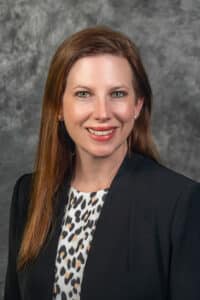By Deborah Jeanne Sergeant

Currently senior vice president of operations for Horizon Health Services, Brandy Vandermark-Murray has always had a soft spot for working with adolescents and children, stemming from her own experiences.
“Substance use affected my family of origin,” she said. “Pretty much everyone has someone affected by substance use. It’s like no other behavioral use disorder. I am passionate about serving populations that are overlooked and have a lot of opportunity to do well in society if given the proper resources and opportunity.”
When she began her career 17 years ago as a clinician at Horizon, the biggest issues affecting youth in the substance abuse field were marijuana and alcohol.
That soon shifted, as the opioid epidemic began within her first few years of working in the field. She saw many patients struggling and some dying. She said this helped motivate her to remain in the field.
“We’re losing so many people who are marginalized and often stigmatized and really need the work we do,” Vandermark-Murray said.
Horizon, a nonprofit which operates in locations throughout Western New York, provides outpatient and residential addiction and mental health services. Through the work of Horizon and similar organizations in the past 15 years, more people have become aware of substance use, particularly of the opioid epidemic, and how much addiction affects families. Educational institutions have also been an important part of this change.
In addition to her work at Horizon, Vandermark-Murray began teaching about opioid use disorder at Canisius College five years ago because she views substance use disorder as nearly ubiquitous among troubled families.
“So many people coming out of school want to work with children and families and not substance use disorder,” she said. “I want to give them education on how much this impacts society and this will impact nearly all the populations they’ll meet in sessions. I wanted to give them clinical tools to work with individuals with substance use disorders.”
She continues to push back against stigma directed towards her patients by the general public.
“There is still a belief system is that people who use substances choose to use them,” she said. “They hold that addiction is not a disease. It is a brain disorder. They view people as bad or criminals or have moral failing. Or they think, ‘It doesn’t happen to my friends.’ Or ‘It doesn’t happen here.’ But it happens everywhere.”
The workforce shortage also challenges her organization, along with compassion fatigue of those still working in the field. It’s difficult to lose patients or experience setbacks with them. Limited financial resources hamstring efforts of agencies like Horizon which could operate at greater capacity.
Despite these difficulties, Vandermark-Murray finds fulfillment in her work.
“We see people every day who get healthy,” she said. “Their lives improve and the quality of their lives improve. Those overdoses or incidences are awful, but we have a ton of people whose lives are getting better. We have many who almost die and then work very hard to get better, go back to school, get married, join the workforce.”
“It’s hard, but rewarding. Every day you will be able to say you’re making a difference,” she added. “It sounds cheesy, but is absolutely true.”
